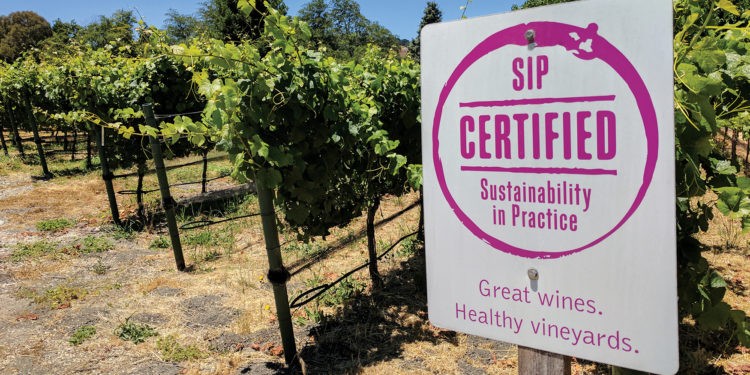Sustainability in Practice

It’s been a difficult year in California. Wildfires have killed hundreds of people while charring tens of thousands of acres and destroying thousands more homes and lives. But, through the devastation, a very important and positive development was occurring on the farms and in the vineyards of California. This year marks the tenth anniversary of SIP (Sustainability in Practice), which helps farmers and winemakers demonstrate their dedication to preserving and protecting resources.
Early on in SIP’s existence, I filmed an episode of my television show, Culinary Travels with Dave Eckert focusing on the group’s efforts and some of its earliest members. It was a fascinating and rewarding experience for me. This fall, I was able to reconnect with some of those early SIP supporters to discuss the importance of the group and the impact its efforts have had on the vineyards, farms, and overall community. I’ll share their thoughts in the next Heathier Planet article. Here, I want to take some time to get to the roots of SIP.
“SIP Certified evolved from the innovative and award-winning programs of the Vineyard Team, a non-profit organization dedicated to sustainability since 1994,” Beth Vukmanic Lopez, SIP Certified Manager, shared with me. “With the creation of SIP Certified in 2008, the organization instituted stricter standards (vineyard farming rules) and shifted from self-assessment to measurable and verifiable third-party certification.”
One of the elements that sets SIP apart from other sustainability efforts is its dedication to preserving and protecting both natural and human resources. Bringing the human factor into the equation requires members to focus not just on the farms, vineyards, or wineries, but who works in those farms, vineyards, and wineries.
“SIP Certified goes well beyond environmental preservation,” Vukmanic Lopez said. “To maintain certification, our vineyards and wineries must also embrace sound, ethical business practices and treat their employees and community with care and respect. Our mission is to promote healthier land, happier people, and more complex and thought-provoking wines.”
SIP’s requirements are also non-negotiable. In no uncertain terms, you are either “all in” with SIP or you are out, and that single-mindedness has made SIP a respected and positive influence.
“It’s clear that the program has depth and weight. There is value to the participants in terms of differentiating their product. There’s value to buyers to have a sustainability claim they can trust. The growth and retention over time proves this, and we’re proud to have created a program that has respect and relevance,” Vukmanic Lopez told me.
I asked Lopez how SIP has evolved through the years and where she sees it heading in the future.
“The certification Standards are a “living document”. As science, technology, and research developments become available the Standards evolve. A Technical Advisory Committee reviews one to three Standards chapters annually and oversees external peer review of entire program every five years,” she told me.
As for the future, Vukmanic Lopez sees more vineyards, wineries, and farms participating. “SIP Certified program has expanded out of California, certifying the first vineyard in Michigan in 2016. The same year, a winery certification for sustainable wine processing procedures was added, creating a complete block to bottle certification,” Vukmanic Lopez said.
No doubt, SIP’s growth is both impressive and verifiable. Starting with a pilot program of 3,700 acres of vines in Monterey and Santa Barbara counties, there are now 43,600 acres of vines in California and Michigan and more than 36 million bottles of wine that have been SIP Certified.
Who knows, maybe in the future, farms, vineyards, and wineries in Kansas and Missouri will sign on with SIP. If they do, I hope to be there to report it.






